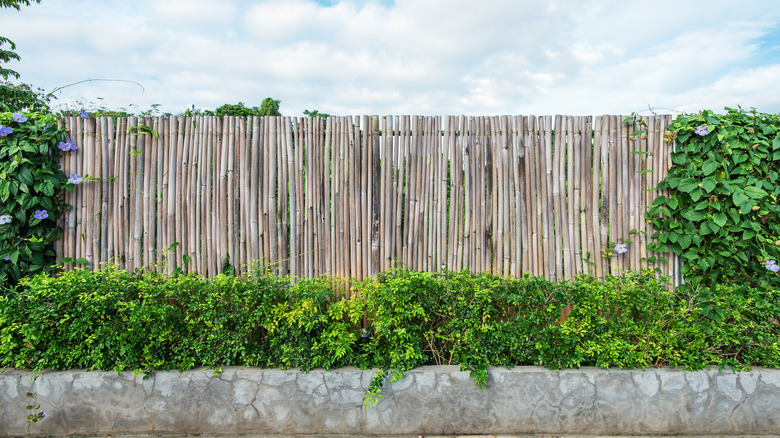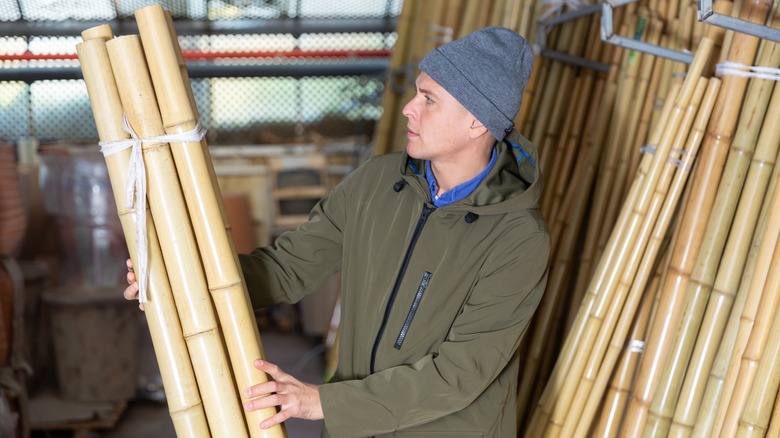The Pros And Cons Of Installing A Bamboo Privacy Fence In Your Yard
We may receive a commission on purchases made from links.
Considering a bamboo privacy fence for your yard? After all, there's nothing quite like retreating to a backyard sanctuary to relax and unwind without the views of neighbors and passersby. Bamboo is an increasingly popular material for creating an outdoor privacy fence on a budget, as it has a natural look, is durable, is eco-friendly, and is sold for a cheap price. However, bamboo fencing has its drawbacks. As a natural material, it's still vulnerable to insects and rot, meaning it'll require much more maintenance to keep it in good condition. It also requires a base, frame, or support to be installed — it usually won't stand on its own. Before installing a bamboo privacy fence in your yard, you should consider all the pros and cons.
First, though, find out what bamboo privacy fences are made of. If you think bamboo is wood, guess again. Though similar in resemblance to timber, this versatile plant is actually a member of the grass family, with over 1,200 species. From covering an old chain fence to surrounding a patio or garden, bamboo adds both a natural and unique texture to your landscape design. If you still want to use this fence material after you consider all the pros and cons, it can be purchased at home improvement stores. For instance, you could purchase a 6-foot tall by 16-foot long Bamboo Slats Screening Fence from The Home Depot for about $60.
Pros: durable, eco-friendly, and low cost
If organic and sustainable fencing is important for your new yard addition, bamboo will likely be your top choice. It has a much lower environmental impact compared to other building materials. This is because harvesting the stalks or "shoots" doesn't kill the plant. Instead, this environmentally-friendly grass will continue growing from the root, helping slow deforestation. Furthermore, some bamboo species have the Guinness World Record for the fastest growing plant in the world, thus making it an increasingly popular choice for renewable fencing material.
You also can't deny the natural aesthetic and texture of a bamboo privacy fence, especially if you're going for a nature-inspired backyard design. It's available in a wide range of styles and finishes, and you can stain it or paint it any color you see fit. As ready-made fencing, bamboo is quite an inexpensive material. You can purchase bamboo at $6 to $12 per linear foot or even cheaper, making it less expensive than wooden and aluminum fences.
Above all else, bamboo is surprisingly durable. It's tensile strength is stronger than steel, yet it's also very lightweight and easy to install. Because of this, it makes sense why bamboo is popularly used in construction around the world.
Cons: high maintenance and requires a base
While an affordable and sustainably-sourced bamboo fence is a great addition to any backyard, it can be a pain to maintain. Ready-made bamboo fencing may be treated, but you'll still have to regularly clean it, re-apply a protective coating, and monitor it for damage. This is because bamboo can crack and fade overtime from exposure to the sun and weather. It's also not completely insect- or rot-resistant. Bamboo is durable, but unfortunately termites and decay from fungi can still severely damage it. You'll need to schedule regular inspections to prevent infestations. Also, not all bamboo fencing is treated with a water-based sealant. If you live in a tropical region or somewhere that receives a lot of rain, too much moisture can cause it to rot and decay.
Also keep in mind that bamboo fencing is typically installed on another type of fence that's used as a base. It typically cannot stand on its own without some type of other support or frame. However, you could use it to hide your neighbor's fence with a DIY that would elevate the look of your yard. Still "on the fence" about installing bamboo for yard privacy? Here's how to choose the right backyard fencing for you.


